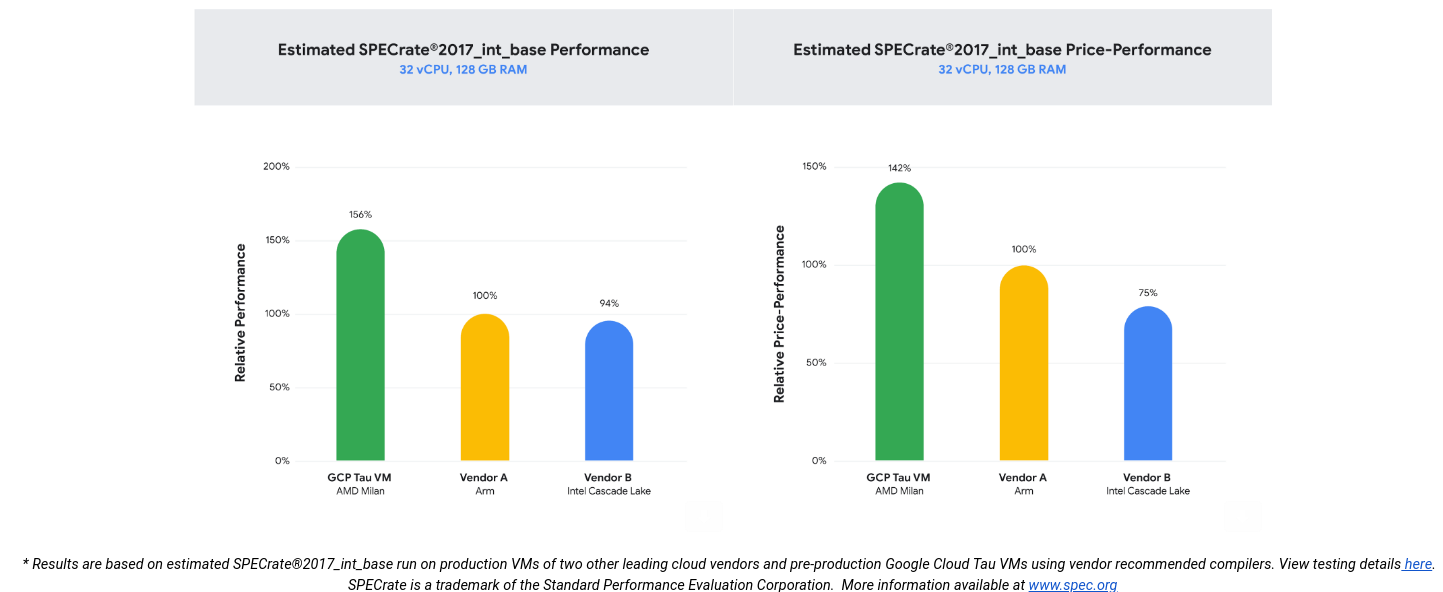 CLOUD
CLOUD
 CLOUD
CLOUD
 CLOUD
CLOUD
Google LLC announced a new family of cloud virtual machines today that it said are ideal for customers operating the most demanding, scale-out workloads.
The new Tau VMs are based on Advanced Micro Devices Inc.’s latest 3rd Gen EPYC processors and Google reckons they provide a greater price-performance than any of its rival’s offerings. Scale-out workloads are those distributed over a large number of machines.
In a blog post, Urs Hölzle, Google’s senior vice president of cloud infrastructure, and June Yang, vice president and general manager of Google Cloud compute, said one of the key advantages of the new Tau VMs is their compatibility with x86-based processors. What that means is that customers won’t need to waste any time or resources refactoring their applications to run on them. Instead, they can switch their apps to the new VMs immediately.
The Tau VMs, part of the Google Compute Engine suite, will come in multiple VM shapes with a maximum of 60 virtual central processing units per VM and 4 gigabytes of memory per vCPU, Hölzle and Yang said.
The other big advantage is that the Tau VMs support Google Kubernetes Engine workloads from day one. Google said that’s essential because the vast majority of scale-out applications these days are built using software containers that host their various components. GKE gives customers an easy way to manage those containers.
“GKE supports Tau VMs on day 1, helping you optimize price-performance for your containerized workloads,” Hölzle and Yang said. “You can add Tau VMs to your GKE clusters by specifying the T2D machine type in your GKE node-pools.”
Other examples of scale-out workloads the Tau VMs are aimed at include jobs such as web servers, containerized microservices, data-logging processing, media transcoding and large-scale Java applications, Hölzle and Yang explained.
AMD debuted its 3rd Gen EPYC server chips in March. They’re based on the company’s latest Zen 3 seven-nanometer core design and can deliver 19% more instructions per cycle on average for most workloads compared with its previous-generation EPYC chips. That helps them provide 106% more performance than Intel’s best comparable processors when running certain cloud workloads, AMD said at the time.
Google makes some equally impressive performance claims for the Tau VMs based on those new chips. For example, Google said they offer 56% higher absolute performance and a 42% superior price-performance than the general-purpose VMs from its cloud rivals, including Amazon Web Services Inc.’s AWS Graviton VMs based on Arm processors. Full details of the benchmark tests that showed these results can be found here.

Google Cloud Chief Executive Thomas Kurian said the Tau VMs provide customers with a strategic way to speed up performance while reducing their compute costs. “Our work with key strategic partners like AMD has allowed us to broaden our offerings and deliver customers the best price performance for compute-heavy, business-critical applications,” he insisted.
Validation of Google’s price and performance claims appears to come from International Data Corp. analyst Matt Eastwood, who said the Tau VMs are an important extension to Google’s Compute Engine portfolio. “Tau VMs deliver on both fronts, providing an attractive combination of performance and price compared to other leading cloud providers,” he said. “The initial testing results for Tau VMs demonstrate the ongoing commitment Google has to innovating in scale-out platforms.”
More important, perhaps, is that the Tau VMs demonstrate how Google Cloud is once again moving faster than the competition, another analyst, Holger Mueller of Constellation Research Inc., told SiliconANGLE. “Google is once again challenging Amazon and Microsoft by being the first to offer VMs on AMD’s latest EPYC processor with its encompassing performance and cost benefits,” he said. “But it’s only a matter of time before the competition will respond.”
Google said the Tau VMs will be priced to support significant total cost of ownership and price-performance improvements for cloud applications. Full pricing details are not yet available but a 32vCPU Tau VM with 128GB of RAM will cost $1.352 per hour for on-demand usage in Google’s us-central region, it said.
The Tau VMs will launch in various regions in the third quarter of the year, Google said. Interested customers are invited to sign up using this form.
Google has been rapidly expanding the available VM options in its cloud. Today’s announcement follows the launch in March of Google’s most powerful cloud instances of all, the A2 VMs powered by Nvidia Corp.’s A100 graphics processing units and designed for intensive machine learning and high-performance computing tasks.
THANK YOU